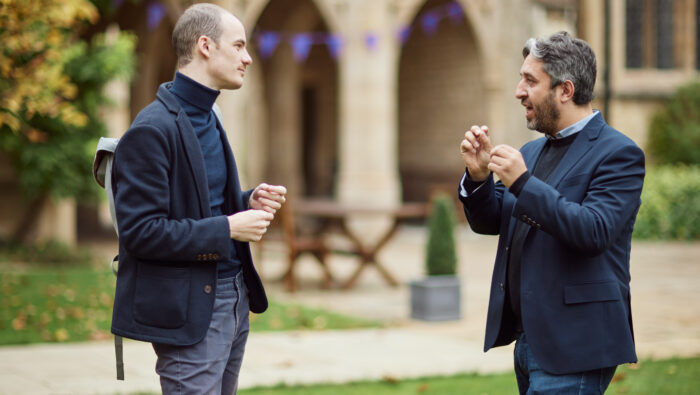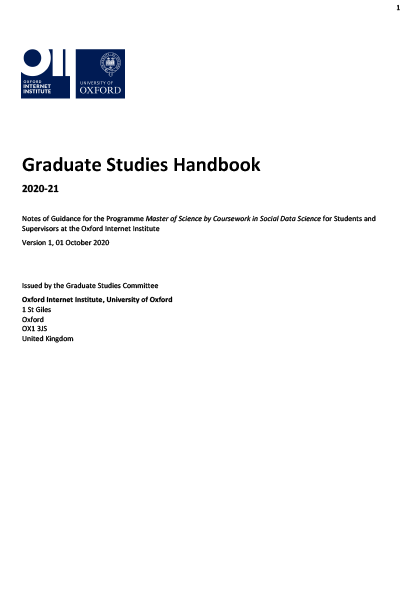Duration:
- Full-time: 10 months
Part-time: 22 months
Start date:
- October 2025
Deadlines:
12 noon UK time (midday) on:
- Friday 15 November 2024
- Thursday 9 January 2025
- Tuesday 4 March 2025 (part-time applicants only)
The MSc in Social Science of the Internet provides students with the knowledge and skills needed to question and understand the multi-faceted ways in which the Internet and emerging digital technologies are influencing and effecting our lives, societies, businesses, and governments.
Learning from the Oxford Internet Institute’s world-leading multi-disciplinary faculty, students of the MSc program will leave with new knowledge on important social science concepts and theories, research methods, technological fundamentals, and how to conduct and communicate high-quality research.
You will take a combination of core papers, option papers and method option papers and produce a thesis of up to 15,000 words on a topic of your choosing based on discussions with a thesis supervisor.
During Trinity Term, you will attend weekly seminars where you will present and develop your thesis research and receive feedback from fellow students and academic staff.
The course aims to equip you with essential theoretical tools and methodological skills. You are introduced to the empirical evidence necessary for an in-depth understanding of the role of the Internet in society, including the changing nature of governance and the theoretical, practical and ethical questions surrounding Internet use.
On completion of the course, students will have:
All applications must be made through the University of Oxford Graduate Admissions site.
Applications submitted for all deadlines are given equal consideration. Please ensure that you start the online application process as early as you can, to ensure plenty of time to complete your application. Only applications that are complete by the deadline (including letters of reference) can be considered by the admissions team.
For MSc applicants interested in continuing on to doctoral study, please note that a separate application form to the combined MSc + DPhil (1+3) admissions route is no longer required. To be considered for MSc + DPhil (1+3) funding, applicants should apply to the MSc in Social Science of the Internet only and submit an ESRC Grand Union Doctoral Training Partnership application as part of their other application materials.
This MSc can form part of the Oxford 1+1 Programme, which enables students to combine their MSc with the Oxford MBA (Said Business School) in order to provide a two-year Oxford postgraduate experience that combines the depth of study of an MSc, with the managerial and leadership breadth of an MBA.
The Oxford Internet Institute is participating in the University of Oxford’s pilot on selection procedures, which aims to explore actions aimed at better contextualising admissions procedures for graduate students while minimising conscious and unconscious bias. For all our courses, the socio-economic data you provide in the application form will be used to contextualise the shortlisting and decision-making processes. For details about the pilot and the actions we are taking, please see the University’s page on the Pilot selection procedure.
12 noon UK time (midday) on:

Former MSc SSI Course Director
Keegan is the Programme Director of the MSc course.

MSc Coordinator
David is the MSc Coordinator, and administrates the course.

Our induction programme is usually held in the first week of October, the week preceding the start of Michaelmas Term (also referred to as 0th week). During Induction Week students will be formally introduced to the OII’s Director, Director of Graduate Studies, Programme Directors, Graduate Studies Support team, as well as our faculty and administrative team. In addition students will be offered a full tour of the OII’s facilities and introduced to IT and library resources, followed by several informative MSc induction sessions. There is also ample opportunity to get to know fellow students and staff through student-led social activities and an afternoon drinks reception.
Students are assigned a general supervisor in the first term of their studies. The general supervisor can answer general questions and help the student navigate the department. In the second term students are then assigned a thesis supervisor with more direct topical or research experience for the student’s chosen thesis project. The department provide resources to help students discover faculty and propose a suitable thesis supervisor. This may include a booklet of thesis topics or a social event to introduce faculty.
Our MSc students are provided with working space in the department. Students in the MSc program have access to local server provisions with both CPU and GPU capabilities as well as opportunities for access to Oxford’s high performance computing resources via Advanced Research Computing (ARC). Students are provided with collaborative software such as Office365 and Overleaf. The MSc room is adjacent to the OII’s library, specialising in social sciences, technology and computing. Students also have digital and physical access to the Bodleian Libraries, the University’s main research library.
In addition to the pastoral support provided your college, as a department the OII seeks to support students by various means. Each degree programme has dedicated administrative support and the administrators in question will be able to help and advise students on a range of matters relating to their studies, or point them towards dedicated sources of support elsewhere in the University. Supervisors and the Director of Graduate Studies can also serve as a source of support, in addition to our dedicated disability lead and several Harassment Officers who can assist with connecting students with the appropriate support.
MSc students take four compulsory core papers designed to provide students with core skills, methods, theories and concepts required to undertake the remainder of the degree. This includes laboratory and practical exercises, to ensure that students are competent with particular techniques and able to use statistical and other software packages.
Please note that this course offering is provisional, and may be subject to change.
Option papers enable students to pursue issues of particular interest in greater depth, whilst developing their specialist skills and applying them to the Internet and its evolving technologies. Students are required to take three option papers in total from a list of option courses offered by the Oxford Internet Institute: one substantive option paper, one methods paper, and one further option paper from either category. Please note that this course offering is provisional, and may be subject to change.
Each student will select at least one substantive option from the list below:
Each student will select at least one methods option paper from the list below:
Students will be required to complete a thesis of up to 15,000 words on a topic of their choosing after discussion with their supervisor. This provides students with the opportunity to apply the methods and approaches they have covered in the other parts of the course and carry out a substantive piece of academic research on a specialist topic of their choosing.
The MSc in Social Science of the Internet degree has a highly multi-disciplinary focus, which is reflected in the wide range of topics addressed in final theses.
2023
2022
The MSc consists of four core papers, three option papers, and the thesis.
The MSc course runs from October to August. Oxford University terms are referred to as Michaelmas Term, Hilary Term, and Trinity Term and normally last eight weeks. Please note that this information is provisional, and may be subject to change.
| Michaelmas Term: Core Papers | Hilary Term: Option Papers | Trinity Term: Thesis |
|---|---|---|
|
|
The course content for the part-time degree is identical to that taken by full-time students but will be completed in two years rather than one year. Students will be expected to attend lectures, classes and tutorials in the department for one to two days a week during term-time, and to participate fully in the life of this friendly and dynamic department.
Year 1
| Michaelmas Term: Core Papers | Hilary Term: Option Papers | Trinity Term: Thesis |
|---|---|---|
|
|
Year 2*
| Michaelmas Term: Core Papers | Hilary Term: Option Papers | Trinity Term: Thesis |
|---|---|---|
|
|
Details of fees, living expenses, and definitions of home and overseas students, together with information about potential sources of funding are available from the University’s Fees and Funding website.
There are a number of sources of funding for postgraduate students at Oxford. Details of all scholarships for which candidates may be eligible can be found on the University Fees and Funding Website. To be considered for any of these scholarships both full- and part-time applicants MUST apply by the January deadline. The scholarships are all highly competitive and are awarded on academic merit.
Clarendon is one of the biggest of the University’s scholarship schemes, offering around 170 new scholarships each year to academically outstanding graduates. Clarendon scholarships are competitive, prestigious and highly sought-after. As well as providing for fees and living costs Clarendon aims to enhance the Oxford experience by offering students the chance to form lasting social, academic and professional networks. Students can apply by completing the funding sections of the graduate admissions form. As part of the admissions process, the Oxford Internet Institute Scholarship Committee will decide which applicants to nominate to the University for consideration. Further details of this scholarship can be found on the University’s Clarendon Scholarships page.
The Grand Union DTP ESRC studentship is for MSc applicants who wish to continue on to doctoral study at the OII, or for applicants to the DPhil programme only.
The ESRC is the UK’s largest organisation for funding research on social and economic issues. The University, in collaboration with Brunel University and the Open University, hosts the Grand Union Doctoral Training Partnership – one of fourteen Doctoral Training Partnerships accredited by the ESRC as part of a Doctoral Training Network.
The Oxford Internet Institute’s graduate degree programmes are a recognised doctoral training pathway in the partnership and our Digital Social Science pathway is provided through two routes, Masters-to-DPhil (known as 1+3) and DPhil-only (known as +3), and is available to students studying part-time as well as those studying full-time.
In order to be considered for 1+3 funding via the Grand Union DTP ESRC studentship, you must apply to an OII MSc programme and select ‘ESRC Grand Union DTP Studentships in Social Sciences’ in the University of Oxford scholarships section of the University’s graduate application form. You must also complete a Grand Union DTP Application Form and upload it, together with your graduate application form, to be considered for nomination for the studentship.
Information about ESRC studentships at Oxford can be found on the Grand Union DTP website. Please ensure you have read all of the guidance available on the website before completing the Grand Union DTP Application Form. Questions can be directed to the Grand Union DTP Office.
ESRC studentships are open to both Home (UK) and International candidates, read more about the eligibility criteria here.
Black Academic Futures
The Black Academic Futures Scholarships offer up to 30 scholarships for UK Black and Mixed-Black students to pursue graduate study at Oxford. Applicants need to apply to an Oxford department by the January programme deadline to be considered for the scholarship and ensure they include the ethnicity information in their application.
Rhodes and Marshall Scholars
The OII welcomes a number of Rhodes and Marshall Scholars onto the MSc programme every year. Eligible students should apply for those scholarships before applying for a place on the MSc programme.
Refugee Academic Futures
The Refugee Academic Futures scheme offers financial support to pursue graduate study at Oxford to students who are refugees or other people with lived experience of displacement. Applicants need to apply to an Oxford department by the January programme deadline to be considered for the scholarship.
Care-Experienced Academic Futures
The Care-Experienced Academic Futures scholarships offer financial support to students who have experienced being in care in the UK to pursue graduate study at Oxford.
Weidenfeld-Hoffmann Scholarships and Leadership Programme
The Weidenfeld-Hoffmann Scholarships and Leadership Programme provides the opportunity to pursue fully-funded graduate studies at the University of Oxford, combined with a comprehensive programme of leadership development, long-term mentoring and networking.
To be considered for this scholarship, you must select the Weidenfeld-Hoffmann Scholarships and Leadership Programme in the University of Oxford Scholarships section of the University’s graduate application form and submit your application for graduate study by the January deadline for your course.
OII Shirley Scholarship
The OII awards a limited number of MSc Scholarships each academic year. These scholarships are open to students (from any country) and all applicants who are offered a place on our programme are automatically considered for an award. Scholarships are awarded on the basis of merit.
Recipients of an OII departmental scholarship will be designated as Shirley Scholars, and they will be supported by the Shirley Scholars Fund established in honour of OII founder donor Dame Stephanie Shirley.
Download the handbook for study in the academic year 2024-2025

You can find general FAQs about applying to our courses, studying at the OII, and choosing a college on the study FAQs page.
The MSc in Social Science of the Internet is designed for students interested in research about the Internet and related technologies and their societal implications. Theses in this programme might include quantitative, qualitative, computational or mixed methods applied to a broad range of questions about digital phenomena and could address questions about technology policy or practice. The MSc in Social Data Science is designed for students with core quantitative skills who wish to develop their skills for analysing structured and unstructured data using advanced computational techniques such as machine learning. Theses in Social Data Science might develop new computational approaches for analysing human behavioural data and/or apply such approaches to answer a social science question.
There are two application deadlines for the full-time MSc programme and three application deadlines for the part-time MSc programme. Applications submitted for all deadlines are given equal consideration, but both full-time and part-time applicants who wish to be considered for any scholarships should apply by the January deadline at the latest. Please ensure that you start the online application process as early as you can, to allow for plenty of time to complete your application. Only applications that are complete by the deadline can be considered by the admissions team. All applications must be made through the University of Oxford Graduate Admissions site.
You can read more about the English language requirements for graduate study applications in the graduate application guide. This course requires proficiency in English at the University’s higher level. If you already have English language test scores at the required level achieved within two years of the start of the course to which you are applying, please include them in your application. However, you are not required to provide test scores when you submit your application.
Students are assigned a general supervisor in the first term of their studies. The general supervisor can answer questions and help the student navigate the department. Students will be surveyed on their research interests during the first term and then in the second term students are assigned a thesis supervisor with more direct topical or research experience for the student’s chosen thesis project. The department provide resources to help students discover faculty and propose a suitable thesis supervisor. This may include a booklet of thesis topics or a social event to introduce faculty.
Course fees cover your teaching, and other academic services and facilities provided to support your studies. They do not cover your accommodation or other living costs. You may have seen separate figures in the past for tuition fees and college fees. We have now combined these into a single figure.
See the University’s guidance on fee status and fee liability for information on Home/Republic of Ireland, Islands and Overseas student classification. As well as covering University and College fees, students will also have to support their maintenance costs. As Oxford is a relatively expensive place to live, it is recommended that students consult the University’s guidance on living costs when planning their budget, to cover accommodation, meals and other living expenses.
Full-time students are required by the University’s regulations to be in residence in Oxford for each of the 8 weeks of Michaelmas, Hilary and Trinity terms. You will be free to leave Oxford after the end of each term but are advised to return during the week prior to the start of the next term (referred to as 0th week). In addition, students are required to sit written examinations in 0th week in their second term and thus must be resident in Oxford at this time.
We have structured the course so that during Michaelmas Term (the first term in the academic year) and Trinity Term (the last term in the academic year), you will only need to spend one day a week in Oxford. During Hilary Term (the second term in the academic year), there are several options courses, so the days and times you are in Oxford will depend on which courses you take. You will also need to set aside one further day a week (or the equivalent hours) in all three terms for independent study.
During all three terms part-time students will need to be able to commit to spending to at least one day a week in Oxford for the eight consecutive weeks of each term, as a minimum. In addition, in their first year part-time students will need to be present in Oxford for the full Induction Week (normally held the first week of October).
After receiving your offer, it is usually possible to change from full-time to part-time, subject to your college’s agreement. However, it is not normally possible to change from part-time to full-time after receiving your offer, due to greater constraints on the number of full-time college places. Changes from part-time to full-time will only be considered where students can provide evidence of a scholarship award which is only tenable when admitted as a full-time student.
The only difference between the part-time and full-time programmes is that for the part-time students, the courses will be spread out over two years. All of the courses will be the same. During Trinity Term of your first year (the final term of the academic year), you will work on your thesis proposal which will be due the first day of Michaelmas Term (the first term of the academic year) of your second year. Full-time students will be working on their thesis during Trinity Term.
Part-time students are not expected to live in Oxford. We have structured the course to ensure that part-time students, who may also have work commitments throughout their studies, will only need to attend the Oxford Internet Institute on one or two days per week.
Ordinarily part-time students must be legally resident in the UK or hold a visa that permits part-time study. For further information, please refer to the Home Office’s information on student visas.
Applicants who are not resident in the UK may be able to enter on a part-time Student Visa; however, please be aware that this visa type does not permit the holder to undertake any work for the duration of their studies, paid or voluntary. For any queries please contact the Student Immigration team.
